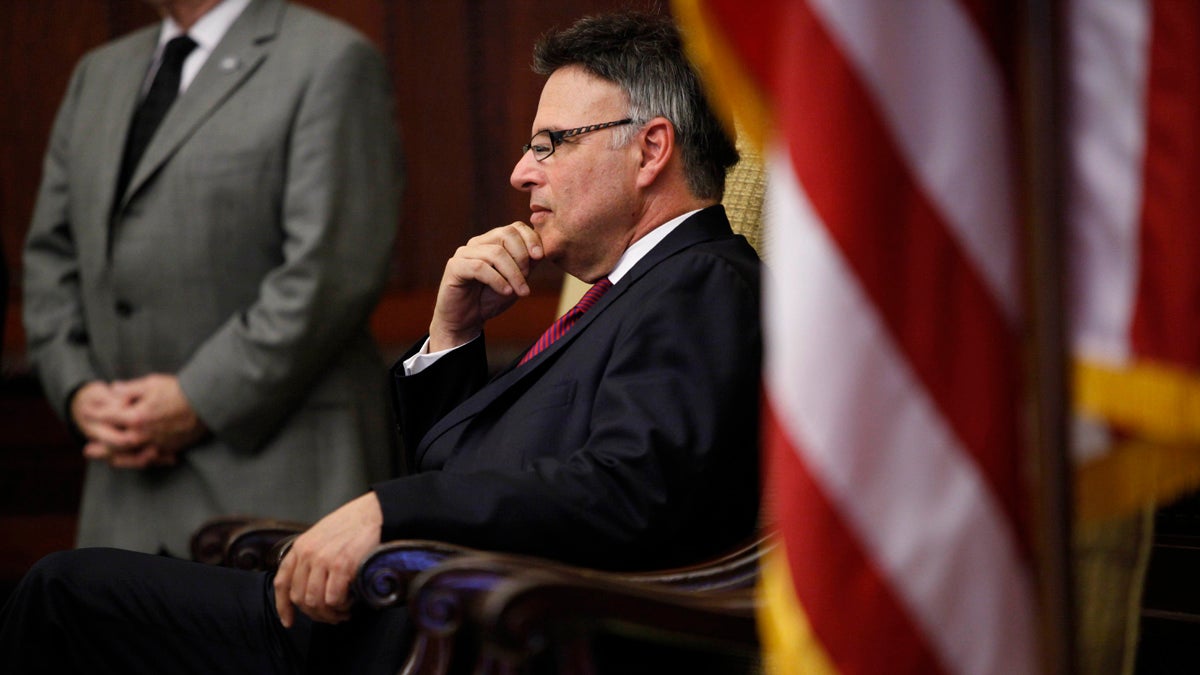What Harrisburg can learn from Philly about fiscal discipline
Listen
When Jonathan Saidel was city controller in the '80s, he says Philadelphia officials passed increasingly creative budgets, pretending the city would get the cash it needed to support the spending everyone wanted. A similar situation seems to exist in Harrisburg. (AP file photo)
A lot of Harrisburg politicians think of Philadelphia government as corrupt, mismanaged, and wasteful.
But as I watch the budget drama play out in Pennsylvania’s Capitol — with leaders passing a spending plan without revenue to fund it, relying on borrowing and one-time fixes to plug holes, or assuming revenue from expanded gambling that never materializes, as the governor and Legislature did last year — I think our friends on the banks of the Susquehanna might learn a thing or two from Philly.
Many years ago, Philadelphia dug itself into such a hole that it ended up with a state oversight board that pretty much put an end to phony budgets and forced leaders to make decisions about its spending priorities.
I saw this happen.
In the 1980s, Philadelphia careened from one fiscal crisis to another. Every year’s budget process seemed to lead to all-night negotiations that resulted in spending plans nobody quite trusted.
Jonathan Saidel was city controller then. He said city officials passed increasingly creative budgets, in which they pretended the city would get the cash it needed to support the spending everyone wanted.
“The city used to just continue to pass these budgets that were based upon, manana,” Saidel reminisced in a phone interview.
Budgets would count on big increases in state aid or money from selling parking garages. When they didn’t happen, deficits would grow and the next budget would require more fudging.
The city hit the wall in 1990.
“What happened was we began to run out of cash,” Saidel said.
The crisis was palpable. Trash trucks didn’t roll because the city wasn’t buying tires and oil filters. City lawyers were buying their own office supplies.
The city skated dangerously close to missing payroll.
The way out
Eventually city and state officials crafted a solution, which included the creation of a state oversight board. Known by the acronym PICA, the Pennsylvania Intergovernmental Cooperation Authority scrutinized budgets and could impose sanctions if the city veered off course.
Ed Rendell was the first mayor under the new order, which also required the city to show the board a five-year financial plan every year.
“That makes a big difference,” Rendell said in an interview. “Because you know if you’re doing five-year budgeting, you can’t say, ‘Well, we’re going to get rid of our accumulated deficit by borrowing,’ because, you know, what happens in year two?”
In the 25 years since, Philadelphia has faced fiscal challenges, but the discipline of honest budgeting meant officials had to make tough choices to cut spending or raise revenue. They couldn’t put them off and hope things would get better.In Harrisburg, they can still pretend — if the Legislature and the governor are willing.
Pennsylvania Budget and Policy Center director Marc Stier said that’s more likely when Republican lawmakers won’t raise taxes and the Democratic governor has an agenda that costs money.
“When you have this kind of disagreement, and one side won’t agree to deeper cuts in spending and the other side won’t agree to recurring revenues, the only way to get out of town really is to come up with phony budgets, which we’ve been doing year after year after year,” Stier said.
A boss for the bosses?
It seems the state might benefit from an oversight board of its own, but there’s a problem. The PICA board that oversees Philadelphia’s finances was enacted by the Legislature and signed by the governor.
Are they going give some of their own power to an independent board? Not so likely.
In theory, Stier said, the state could create an independent body and give it the authority to freeze some state revenue if lawmakers and the governor don’t enact a realistic budget.
“It would be an unusual thing for a government to do,” Stier said. “And one might argue that it’s not fully democratic to give this power up to an unelected body.”
In the meantime, an Independent Fiscal Office in Harrisburg analyzes revenue estimates, but its role is advisory.If elected leaders decide to substitute their judgment for the IFOs, they can.
WHYY is your source for fact-based, in-depth journalism and information. As a nonprofit organization, we rely on financial support from readers like you. Please give today.


